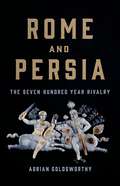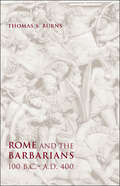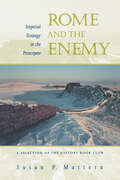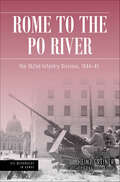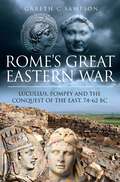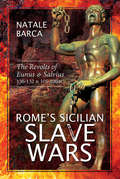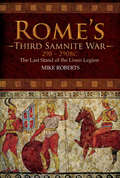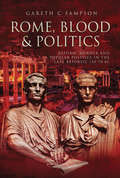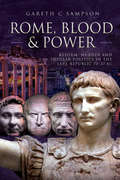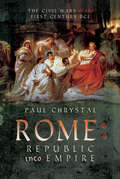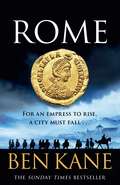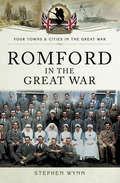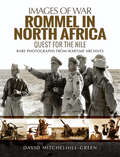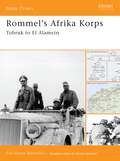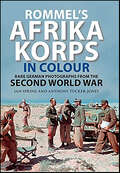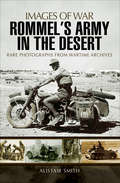- Table View
- List View
Rome and Persia: The Seven Hundred Year Rivalry
by Adrian GoldsworthyA &“magnificent&” (Spectator) history of the epic rivalry between the ancient world&’s two great superpowers The Roman empire was like no other. Stretching from the north of Britain to the Sahara, and from the Atlantic coast to the Euphrates, it imposed peace and prosperity on an unprecedented scale. Its only true rival lay in the east, where the Parthian and then Persian empires ruled over great cities and the trade routes to mysterious lands beyond. This was the region Alexander the Great had swept through, creating a dream of glory and conquest that tantalized Greeks and Romans alike. Tracing seven centuries of conflict between Rome and Persia, historian Adrian Goldsworthy shows how these two great powers evolved together. Despite their endless clashes, trade between the empires enriched them both, and a mutual respect prevented both Rome and Persia from permanently destroying the other. Epic in scope, Rome and Persia completely reshapes our understanding of one of the greatest rivalries of world history.
Rome and the Barbarians, 100 B.C.–A.D. 400 (Ancient Society and History)
by Thomas S. BurnsThe barbarians of antiquity, so long a fixture of the public imagination as the savages who sacked and destroyed Rome, emerge in this colorful, richly textured history as a much more complex—and far more interesting—factor in the expansion, and eventual unmaking, of the Roman Empire. Thomas S. Burns marshals an abundance of archeological and literary evidence, as well as three decades of study and experience, to bring forth an unusually far-sighted and wide-ranging account of the relations between Romans and non-Romans along the frontiers of western Europe from the last years of the Republic into late antiquity.Looking at a 500-year time span beginning with early encounters between barbarians and Romans around 100 B.C. and ending with the spread of barbarian settlement in the western Empire around A.D. 400, Burns removes the barbarians from their narrow niche as invaders and conquerors and places them in the broader context of neighbors, (sometimes bitter) friends, and settlers. His nuanced history subtly shows how Rome's relations with the barbarians—and vice versa—slowly but inexorably evolved from general ignorance, hostility, and suspicion toward tolerance, synergy, and integration. What he describes is, in fact, a drawn-out period of acculturation, characterized more by continuity than by change and conflict and leading to the creation of a new Romano-barbarian hybrid society and culture that anticipated the values and traditions of medieval civilization.
Rome and the Barbarians, 100 B.C.–A.D. 400 (Ancient Society and History)
by Thomas S. BurnsThis historical analysis of Roman-Barbarian relations from the Republic into late antiquity offers a striking new perspective on the fall of the Empire.The barbarians of antiquity, often portrayed simply as the savages who destroyed Rome, emerge in this colorful, richly textured history as a much more complex factor in the expansion, and eventual unmaking, of the Roman Empire. Thomas S. Burns marshals an abundance of archeological and literary evidence to bring forth a detailed and wide-ranging account of the relations between Romans and non-Romans along the frontiers of western Europe.Looking at a 500-year time span beginning with early encounters between barbarians and Romans around 100 B.C. and ending with the spread of barbarian settlement in the western Empire, Burns reframes the barbarians as neighbors, friends, and settlers. His nuanced history subtly shows how Rome’s relations with the barbarians slowly evolved from general ignorance, hostility, and suspicion toward tolerance, synergy, and integration. This long period of acculturation led to a new Romano-barbarian hybrid society and culture that anticipated the values and traditions of medieval civilization.
Rome and the Enemy: Imperial Strategy in the Principate
by Susan P. MatternHow did the Romans build and maintain one of the most powerful and stable empires in the history of the world? This illuminating book draws on the literature, especially the historiography, composed by the members of the elite who conducted Roman foreign affairs. From this evidence, Susan P. Mattern reevaluates the roots, motivations, and goals of Roman imperial foreign policy especially as that policy related to warfare. In a major reinterpretation of the sources, Rome and the Enemy shows that concepts of national honor, fierce competition for status, and revenge drove Roman foreign policy, and though different from the highly rationalizing strategies often attributed to the Romans, dictated patterns of response that remained consistent over centuries.Mattern reconstructs the world view of the Roman decision-makers, the emperors, and the elite from which they drew their advisers. She discusses Roman conceptions of geography, strategy, economics, and the influence of traditional Roman values on the conduct of military campaigns. She shows that these leaders were more strongly influenced by a traditional, stereotyped perception of the enemy and a drive to avenge insults to their national honor than by concepts of defensible borders. In fact, the desire to enforce an image of Roman power was a major policy goal behind many of their most brutal and aggressive campaigns.Rome and the Enemy provides a fascinating look into the Roman mind in addition to a compelling reexamination of Roman conceptions of warfare and national honor. The resulting picture creates a new understanding of Rome's long mastery of the Mediterranean world.
Rome to the Po River: The 362nd Infantry Division, 1944–45 (Die Wehrmacht im Kampf)
by Matthias Strohn Heinz Greiner“…this book shines when it comes to understanding the campaigns on a lower level than has normally shown us by authors.” —A Wargamers Needful ThingsIn late 1943, 362. Infanterie-Division was formed around the remnants of 268. Infanterie-Division, which had been disbanded after high casualties on the Eastern Front. It fought at Anzio in early 1944, overrun when the Allied broke through the German lines in April. During its time at Anzio, the division was involved in the Benedicta massacre. The unit was withdrawn to Rome. Facing the Allied advance, it suffered further losses and had to be rebuilt once more. Returning to the front, it then fought until late April 1945, when it surrendered. This account focuses on the efforts of 362. Infanterie-Division to turn back the Allied forces from their advance north in late 1944 and early 1945. Its commander, Heinz Greiner led the division in a series of counterattacks against Allied forces outside Rome that slowed Allied progress. While Greiner did not have access to the unit war diary while writing this account his experience as commander of 362. Infanterie-Division throughout this period means that it offers a unique insight into the battle from the German perspective as well as a thorough account of the reestablishment, training and combat performance of a German division.
Rome's Executioner: Tribune Of Rome, Rome's Executioner, False God Of Rome (Vespasian #2)
by Robert FabbriA hero is forged in battle and a legend is born in this second installment in the Vespasian seriesThracia, AD30: Even after four years of military service at the edge of the Roman world, Vespasian can't escape the tumultuous politics of an Empire on the brink of disintegration. His patrons in Rome have charged him with the clandestine extraction of an old enemy from a fortress on the banks of the Danube before it falls to the Roman legion besieging it. Vespasian's mission is the key move in a deadly struggle for the right to rule the Roman Empire. The man he has been ordered to seize could be the witness that will destroy Sejanus, commander of the Praetorian Guard, and ruler of the Empire in all but name. Before he completes his mission, Vespasian will face ambush in snowbound mountains, pirates on the high seas, and Sejanus's spies all around him. But by far the greatest danger lies at the rotten heart of the Empire, at the nightmarish court of Tiberius, Emperor of Rome and debauched, paranoid madman.
Rome's Fallen Eagle (Vespasian #4)
by Robert FabbriVespasian's fourth adventure—can he escape his own Emperor's wrath?Caligula has been assassinated and the Praetorian Guard have proclaimed Claudius Emperor—but his position is precarious. His three freedmen, Narcissus, Pallas, and Callistus, must find a way to manufacture a quick victory for Claudius—but how? Pallas has the answer: retrieve the Eagle of the Seventeenth, lost in Germania nearly 40 years before. Who but Vespasian could lead a dangerous mission into the gloomy forests of Germania? Accompanied by a small band of cavalry, Vespasian and his brother try to pick up the trail of the Eagle, but they are tailed by hunters who pick off men each night and leave the corpses in their path. Someone is determined to sabotage Vespasian's mission. In search of the Eagle and the truth, pursued by barbarians, Vespasian will battle his way to the shores of Britannia.
Rome's Great Eastern War: Lucullus, Pompey and the Conquest of the East, 74–62 BC
by Gareth C. SampsonThis military history of Ancient Rome analyses the empire&’s revitalized push against rising enemies to the East. In the century since Rome&’s defeat of the Seleucid Empire in the 180s BC, the East was dominated by the rise of new empires: Parthia, Armenia, and Pontus, each vying to recreate the glories of the Persian Empire. By the 80s BC, the Pontic Empire of Mithridates had grown so bold that it invaded and annexed the whole of Rome&’s eastern empire and occupied Greece itself. But as Rome emerged from the devastating effects of the First Civil War, a new breed of general emerged with it, eager to re-assert Roman military dominance and carve out a fresh empire in the east. In Rome&’s Great Eastern War, Gareth C. Sampson analyses the military campaigns and battles between a revitalized Rome and the various powers of the eastern Mediterranean hinterland. He demonstrates how this series of conflicts ultimately heralded a new phase in Roman imperial expansion and reshaped the ancient East.
Rome's Sacred Flame: Sunday Post's Best Reads Of The Year 2018 (Vespasian #8)
by Robert FabbriVespasian has been made Governor of Africa. Nero, Rome's increasingly unpredictable Emperor, orders him to journey with his most trusted men to a far-flung empire in Africa to free 200 Roman citizens who have been enslaved by a desert kingdom. Vespasian arrives at the city to negotiate their emancipation, hoping to return to Rome a hero and find himself back in favor with Nero. But when Vespasian reaches the city, he discovers a slave population on the edge of revolt. With no army to keep the population in check, it isn't long before tensions spill over into bloody chaos. Vespasian must escape the city with all 200 Roman citizens and make their way across a barren desert, battling thirst and exhaustion, with a hoard of rebels at their backs. It's a desperate race for survival, with twists and turns aplenty. Meanwhile, back in Rome, Nero's extravagance goes unchecked. All of Rome's elite fear for their lives as Nero's closest allies run amok. Can anyone stop the Emperor before Rome devours itself? And if Nero is to be toppled, who will be the one to put his head in the lion's mouth?
Rome's Sicilian Slave Wars: The Revolts of Eunus & Salvius, 136–132 & 105–100 BC
by Natale BarcaA study of the two Late Republic slave revolts, exploring their social context, the nature of slavery at the time, and the causes of the conflicts.In 136 BC, in Sicily (which was then a Roman province), some four hundred slaves of Syrian origin rebelled against their masters and seized the city of Henna with much bloodshed. Their leader, a fortune-teller named Eunus, was declared king (taking the Syrian royal name Antiochus), and tens of thousands of runaway slaves as well as poor native Sicilians soon flocked to join his fledgling kingdom. Antiochus’ ambition was to drive the Romans from the whole of Sicily. The Romans responded with characteristic unwillingness and relentlessness, leading to years of brutal warfare and suppression. Antiochus’ “Kingdom of the Western Syrians” was extinguished by 132, but his agenda was revived in 105 BC when rebelling slaves proclaimed Salvius as King Tryphon, with similarly bitter and bloody results.Natale Barca narrates and analyses these events in unprecedented detail, with thorough research into the surviving ancient sources. The author also reveals the long-term legacy of the slaves’ defiance, contributing to the crises that led to the seismic Social War and setting a precedent for the more-famous rebellion of Spartacus in 73–71 BC.Praise for Rome’s Sicilian Slave Wars“An interesting read, and a good account of these large scale and very significant slave uprisings, giving us an idea of what the rebels were attempting to achieve, the methods they chose, and each revolt managed to survive for so long before being crushed.” —History of War
Rome's Third Samnite War, 298–290 BC: The Last Stand of the Linen Legion
by Mike RobertsA compelling account of alliances, animosities, and ancient warfare in central Italy.The Third Samnite War was a crucial episode in the early history of Rome. Upon its outcome rested mastery of central Italy, and the independent survival of both Rome and the Samnites. Determined to resist aggressive Roman expansion, the Samnites forged a powerful alliance with the Senones (a tribe of Italian Gauls), Etruscans, and Umbrians. The result was eight years of hard campaigning, brutal sieges, and bitter battles that stretched Rome to the limit. The desperate nature of the struggle is illustrated by the ritual self-sacrifice (devotio) by the Roman consul Publius Decimus Mus at the Battle of Sentinum (295 BC), which restored the resolve of the wavering Roman troops, and by the Samnite Linen Legion at the Battle of Aquilonia (393 BC), each man of which was bound by a sacred oath to conquer or die on the battlefield.Mike Roberts, who has travelled the Italian landscape upon which these events played out, mines the sources—which are more reliable, he argues, than for Rome’s previous wars—to produce a compelling narrative of this momentous conflict.
Rome, Blood & Politics: Reform, Murder and Popular Politics in the Late Republic, 133–70 BC
by Gareth C. SampsonThis in-depth chronicle examines the series of political upheavals that led to division, violence, and civil war in the ancient Roman Republic. The last century of the Roman Republic saw the consensus of the ruling elite shattered by a series of high-profile politicians who proposed political or social reform programs, many of which culminated in acts of bloodshed on the streets of Rome itself. This began in 133 BC with the military recruitment reforms of Tiberius Gracchus, which saw him and his supporters lynched by a mob of angry Senators. Gracchus&’s grim example was followed by a series of radical politicians, each with their own agenda that challenged the status quo of the Senatorial elite. Each met a violent response from elements of the ruling order, leading to murder and even battles on the streets of Rome. These bloody political clashes paralyzed the Roman state, eventually leading to its collapse. Covering the period 133–70 BC, this volume analyzes each of the key reformers, what they were trying to achieve and how they met their end, narrating the long decline of the Roman Republic into anarchy and civil war.
Rome, Blood & Power: Reform, Murder and Popular Politics in the Late Republic 70–27 BC
by Gareth C. Sampson&“Capture[s] the essence of the struggle within Rome for reform and power and dominance . . . a page turner of a book . . . that offers fresh insight.&” —Firetrench Following the First Civil War the Roman Republic was able to rebuild itself and restore stability. Yet the problems which had plagued the previous seventy years of the Republic, of political reform being met with violence and bloodshed, had not been resolved and once again resumed. Men such as Catiline and Clodius took up the mantle of reform which saw Rome paralyzed with domestic conflict and ultimately carnage and murder. In the search for stability, the Roman system produced a series of military dynasts; men such as Pompey, Crassus and Caesar. Ultimately this led to the Republic&’s collapse into a second and third civil war and the end of the old Republican system. In its place was the Principate, a new Republic founded on the promise of peace and security at home and an end to the decades of bloodshed. Gareth Sampson analyses the various reforming politicians, their policies and opponents and the conflicts that resulted. He charts the Republic&’s collapse into further civil wars and the new system that rose from the ashes. &“[Sampson] has obviously done a huge amount of research, and yet managed to turn what could be a dry subject into an interesting tale of men battling for control. Far more exciting than Game of Thrones, and with added gladiators!&” —Army Rumour Service (ARRSE)
Rome: The Civil Wars of the First Century BCE
by Paul ChrystalRome: Republic into Empire looks at the political and social reasons why Rome repeatedly descended into civil war in the early 1st century BCE and why these conflicts continued for most of the century; it describes and examines the protagonists, their military skills, their political aims and the battles they fought and lost; it discusses the consequences of each battle and how the final conflict led to a seismic change in the Roman political system with the establishment of an autocratic empire. This is not just another arid chronological list of battles, their winners and their losers. Using a wide range of literary and archaeological evidence, Paul Chrystal offers a rare insight into the wars, battles and politics of this most turbulent and consequential of ancient world centuries; in so doing, it gives us an eloquent and exciting political, military and social history of ancient Rome during one of its most cataclysmic and crucial periods, explaining why and how the civil wars led to the establishment of one of the greatest empires the world has known.
Rome: The action-packed, rip-roaring historical epic from the Sunday Times bestseller!
by Ben Kane'Highly recommend for anybody who loves Roman history, written by one of its true masters' PETER GIBBONS'Epic in scope and intimate in historical detail' MATTHEW HARFFY'Authentic, fast-paced and immersive' CHRISTIAN CAMERON'A masterpiece of late Rome' S.J.A. TURNEY'Historical settings and characters that leap into life straight off the page' SCOTT MARIANI'A vivid page-turning epic' ANNE O'BRIENFor an empress to rise, a city must fall...Rome, 410 ADHalf-sister to Emperor Honorius, unmarried and powerless, twenty-year-old Galla Placidia watches from the shadows as imperial policies are made and unmade. Her plans to gain power and influence are halted when the city is besieged and captured by a vast army led by Alaric the Visigoth. Taken hostage, travelling out of Italy, Galla Placidia falls in love and marries a barbarian king. At a time when Rome's power is fast dwindling, its authority diminishing year upon year, she embarks on a dangerous and remarkable journey towards the imperial throne.But what price must a woman pay for power?This is the compelling story of a little-known, remarkable woman whose burning ambition saw her, against all odds, become empress of Rome.What your favourite authors have to say about Ben Kane:'A rip-roaring epic' PAUL FINCH'A truly vibrant and gripping read' HELENA GUMLEY-MASON'Historical fiction has never been more visceral' JAMES ROLLINS'A tour de force on an epic scale' DOUGLAS JACKSONReaders are loving Ben Kane:'Powerful evocation of our history' ⭐⭐⭐⭐⭐'An engaging and exciting read' ⭐⭐⭐⭐⭐'Gripped me from start to finish' ⭐⭐⭐⭐⭐'Epic tales, gorgeous prose, non-stop action' ⭐⭐⭐⭐⭐'Rich in period detail and lively in narrative' ⭐⭐⭐⭐⭐
Rome: The brand new epic historical adventure for Summer 2025!
by Ben Kane'Historical settings and characters that leap into life straight off the page' SCOTT MARIANI'A vivid page-turning epic' ANNE O'BRIEN'Engaging, immersive, thrilling. Highly recommend for anybody who loves Roman history, written by one of its true masters' PETER GIBBONSFor an empress to rise, a city must fall...Rome, 410 ADHalf-sister to Emperor Honorius, unmarried and powerless, twenty-year-old Galla Placidia watches from the shadows as imperial policies are made and unmade. Her plans to gain power and influence are halted when the city is besieged and captured by a vast army led by Alaric the Visigoth. Taken hostage, travelling out of Italy, Galla Placidia falls in love and marries a barbarian king. At a time when Rome's power is fast dwindling, its authority diminishing year upon year, she embarks on a dangerous and remarkable journey towards the imperial throne.But what price must a woman pay for power?This is the compelling story of a little-known, remarkable woman whose burning ambition saw her, against all odds, become empress of Rome.What your favourite authors have to say about Ben Kane:'A rip-roaring epic' PAUL FINCH'A truly vibrant and gripping read' HELENA GUMLEY-MASON'An epic tale' MATTHEW HARRFY'Historical fiction has never been more visceral' JAMES ROLLINS'A tour de force on an epic scale' DOUGLAS JACKSONReaders are loving Ben Kane:'Powerful evocation of our history' ⭐⭐⭐⭐⭐'An engaging and exciting read' ⭐⭐⭐⭐⭐'Gripped me from start to finish' ⭐⭐⭐⭐⭐'Epic tales, gorgeous prose, non-stop action' ⭐⭐⭐⭐⭐'Rich in period detail and lively in narrative' ⭐⭐⭐⭐⭐
Rome: The brand new epic historical adventure for Summer 2025!
by Ben Kane'Historical settings and characters that leap into life straight off the page' SCOTT MARIANI'A vivid page-turning epic' ANNE O'BRIEN'Engaging, immersive, thrilling. Highly recommend for anybody who loves Roman history, written by one of its true masters' PETER GIBBONSFor an empress to rise, a city must fall...Rome, 410 ADHalf-sister to Emperor Honorius, unmarried and powerless, twenty-year-old Galla Placidia watches from the shadows as imperial policies are made and unmade. Her plans to gain power and influence are halted when the city is besieged and captured by a vast army led by Alaric the Visigoth. Taken hostage, travelling out of Italy, Galla Placidia falls in love and marries a barbarian king. At a time when Rome's power is fast dwindling, its authority diminishing year upon year, she embarks on a dangerous and remarkable journey towards the imperial throne.But what price must a woman pay for power?This is the compelling story of a little-known, remarkable woman whose burning ambition saw her, against all odds, become empress of Rome.What your favourite authors have to say about Ben Kane:'A rip-roaring epic' PAUL FINCH'A truly vibrant and gripping read' HELENA GUMLEY-MASON'An epic tale' MATTHEW HARRFY'Historical fiction has never been more visceral' JAMES ROLLINS'A tour de force on an epic scale' DOUGLAS JACKSONReaders are loving Ben Kane:'Powerful evocation of our history' ⭐⭐⭐⭐⭐'An engaging and exciting read' ⭐⭐⭐⭐⭐'Gripped me from start to finish' ⭐⭐⭐⭐⭐'Epic tales, gorgeous prose, non-stop action' ⭐⭐⭐⭐⭐'Rich in period detail and lively in narrative' ⭐⭐⭐⭐⭐
Romford in the Great War (Your Towns And Cities In The Great War Ser.)
by Stephen WynnRomford in the Great War tells the remarkable story of Romford and its surrounding areas from the outbreak of the Great War in 1914, to the long-awaited peace of 1918. Romford had a considerable military connection during the war. The area was largely associated with the famous Sportsman's Battalions, the 23rd and 24th Battalions of the Royal Fusiliers, that, as the title suggests, was made up of well-known sportsmen of the day. Initially, the battalion stayed at Hare Hall camp in Romford and Grey Towers Camp in Hornchurch, respectively. The equally famous Artists Rifles took over Hare Hall after the Sportsman Battalion left, and went on to become a renowned officer training corps.The book takes a detailed look at the districts war memorials and rolls of honor, that commemorate the names of the local young men who answered the call to arms to protect their king and country. Wynn explores some of these names in more detail, tweaking out their individual stories of heroism, bravery and devotion to duty no matter what price they had to pay. He also offers a unique flavor of what everyday life was like for the local community, by looking through the local newspapers of the day. A growing paranoia among the masses is addressed, as are the important roles of women, who were keeping the country on top form, whether delivering mail, driving a taxi or working in a local factory, while their husbands, brothers, uncles, sons and fathers were off fighting the war. This is a superb account of the people of Romfords outstanding determination to see the war through.
Rommel and Caporetto (Images Of War Ser.)
by Eileen Wilks John WilksRommel was to become the most respected of all generals in World War Two but no-one outside of a small clique in the German Army had heard of him in 1917. His role at the Battle of Caporetto in 1917 where the Italian Army was humiliated at a catastrophic defeat has received little attention yet it was the springboard for his future success. This makes for a fascinating and important story. The book, by the authors of The British Army in Italy 1917–1918, is based largely on official histories and documents, and on Rommels own account, which gives some insight into the qualities that he was later to exhibit in France and in North Africa.
Rommel in North Africa: Quest for the Nile (Images of War)
by David Mitchelhill-GreenErwin Rommel is the arguably the most well-known German general of the Second World War. Revered by his troops and applauded by his enemies, the so-called Desert Fox achieved legendary status for his daring exploits and bold maneuvers during the North African campaign. In this book, richly illustrated with over 400 images, the author examines the privations and challenges Rommel faced in leading his coalition force. Endeavoring to reach the Nile Delta, we find Rommel's Axis soldiers poorly prepared to undertake such an audacious operation. Much-admired by his men in the front lines, we discover a demanding and intolerant leader, censured by subordinate officers and mistrusted by his superiors in Berlin. Certainly no diplomat, we observe posed interactions with Italian and junior German officers through an official lens. We note Rommel's readiness to take advantage of his enemy's weakness and study his extraordinary instinct for waging mobile warfare. We consider his disregard for the decisive factor of supply and view his army's reliance on captured equipment. We learn how this brave and ambitious commander was celebrated by German propaganda when the Wehrmacht's fortunes in the East were waning. Conversely, analyze why Winston Churchill honored him as a daring and skillful opponent. Finally, we picture this energetic, ambitious, at times reckless, commander as he roamed the vast Western Desert battlefield. This is the story of Rommel in North Africa.
Rommel's Afrika Korps
by George BradfordPortrait of this famous World War II unit at the height of its success Completely illustrated with photos, maps, and diagrams--in color where available In the sands of the Western Desert in 1941-42, Erwin Rommel made history as the Desert Fox, waging a brilliant and bold campaign against the British. Beginning at El Agheila in March 1941, the Afrika Korps--frequently outnumbered--drove the British steadily east across Libya and into Egypt. The German offensive eventually ground to a halt in a series of battles at El Alamein. In impressive detail, George Bradford depicts what it was like to serve and fight in the Afrika Korps, from its tanks and equipment to its battles and daily life.
Rommel's Afrika Korps
by Pier BattistelliIn 1940 a British offensive in the Western Desert provoked a major Italian military disaster. By early February 1941 the whole of Cyrenaica had been lost, and German help became necessary to avoid the loss of the entire of Libya. On 14 February 1941 the first echelons of German troops hurriedly arrived at the port of Tripoli, starting the 27-month German engagement in Northern Africa. This book covers the complex and oft-changing organisation and structure of German forces in North Africa from their first deployment through to the conclusion of the battle of El Alamein, an engagement that irrevocably changed the strategic situation in the Western Desert.
Rommel's Afrika Korps in Colour: Rare German Photographs from the Second World War
by Anthony Tucker-Jones Ian Spring"A marvellous collection of original wartime colour photos…For both historians and modellers, the variations in uniforms and their colours will be a great reference..." — Military Model Scene Take a visual journey through North Africa during the Second World War with Anthony Tucker-Jones and Ian Spring as they chart the path of Erwin Rommel and his Afrika Korps through a series of stunning, rare color photographs. Taken from Ian Spring’s incredible digital archive of over 32,000 original color photographs dated between 1936 and 1946, more than 250 images in Rommel’s Afrika Korps In Color offer readers a vivid, detailed insight into this German expeditionary force and their long North African Campaign. Fascinating color photographs of German soldiers, weaponry, tanks and aircraft fill these pages, and are balanced by the equally captivating and rare photographs of the people and the landscapes of North Africa. Renowned author and military historian Anthony Tucker-Jones’ remarkable text accompanies Ian Spring’s collection of rare photographs, together making for a highly informative and utterly engrossing read. Rommel’s Afrika Korps In Color affords readers a new way of reading and learning about one of the most unique campaigns in the Second World War, and will stay with them long after they turn the final page.
Rommel's Army in the Desert: Rare Photographs from Wartime Archives (Images of War)
by Alistair SmithWhen German General Rommel and the lead elements of what would become the Afrika Korps landed in Libya in February 1941, nobody could have foreseen the legendary status they would achieve. Sent to support the faltering Italians, they were eventually able to drive the Allies to the very gates of Egypt. Fighting over hostile and rugged terrain, often outnumbered and outgunned, they were only finally undone by their defeat at El Alamein and Allied landings to their rear.This collection of photographs is taken from the albums of three members of the vaunted Afrika Korps. For the first time the daily reality of the North African campaign can be seen from the German point of view. With numerous photographs of vehicles and men at work, this collection paints a portrait of the rugged and dangerous conditions as well as the harsh and brutal nature of desert warfare.
Rommel's Desert Warriors (Stackpole Military Photo Series)
by Michael Olive Robert J. EdwardsVisual history of Rommel and his Afrika Korps in the desert of North Africa.
